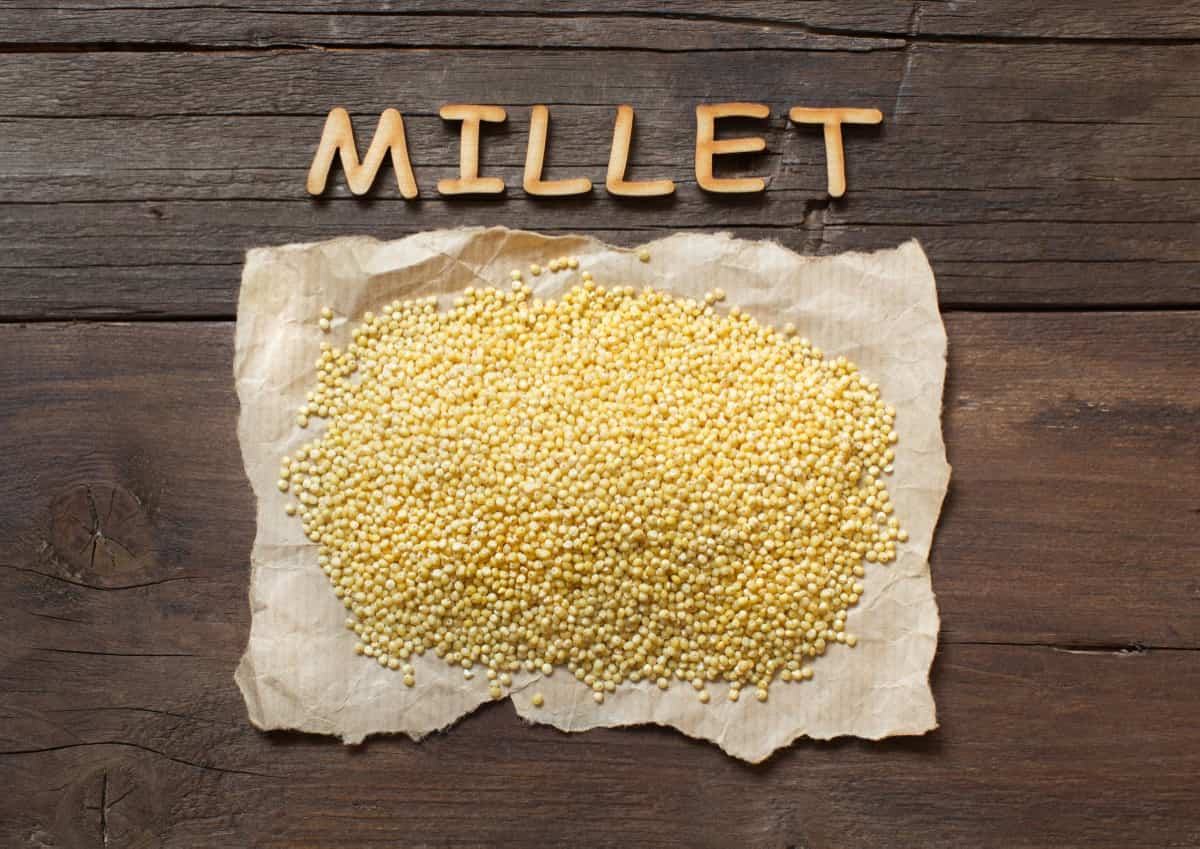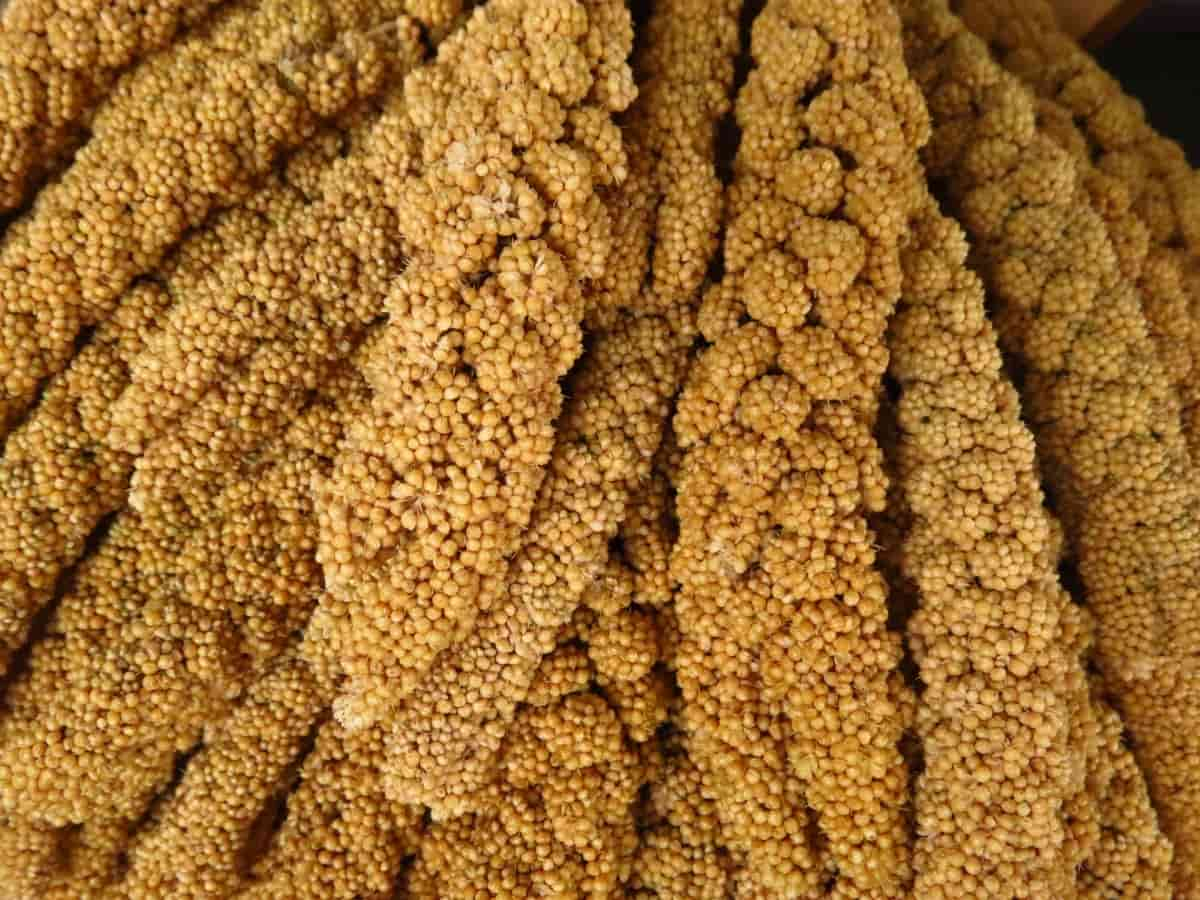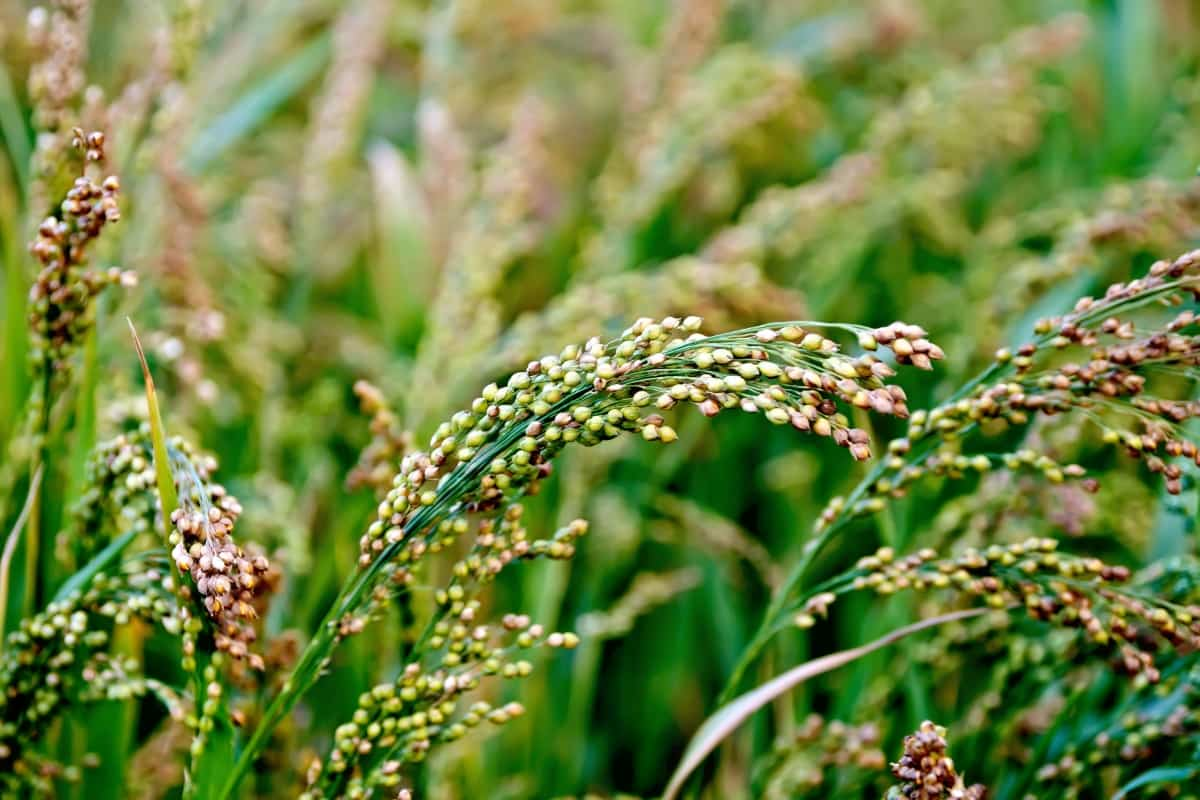Millet is a versatile and nutritious crop that can thrive with proper care. Millet is a cereal crop belonging to the Poaceae family, including other popular grains like wheat and rice. It’s grown worldwide and can thrive in various climates and soil types. Manuring and fertilizing millet are crucial for achieving high yields. Organic manure options such as compost, animal waste, and green manures improve soil fertility.

Millet Manuring and Fertilization
Organic Manuring Techniques for Millet Production
Organic manuring is a method of fertilization that uses natural materials to enrich the soil. This is still widely practiced in millet production. Organic manure can improve soil fertility, increase crop yield, and enhance plant nutrient uptake. One popular organic manuring technique for millet production is the use of compost. Composting involves collecting plant waste, such as leaves, stalks, and stems, then allowing them to decompose naturally over time.
The compost can be spread on fields before planting or during growing stages to provide essential nutrients like phosphorus, potassium, and nitrogen. Green manuring or cover cropping is another effective organic manuring technique for millet farming. This method involves sowing leguminous crops like cowpea or soybean that help fix atmospheric nitrogen into the soil while at the same time suppressing weeds.
Best Fertilizers for Millet Cultivation
When choosing a fertilizer for millet farming, urea-based fertilizers are commonly used due to their effectiveness in providing nitrogen, which is essential for plant growth. Urea and urea-ammonium nitrate solutions are popular choices because they contain high levels of nitrogen that can promote healthy crop development.
Manuring Schedule for Millet Farming
- The right manuring schedule can ensure that your millet crops receive the necessary nutrients at the correct time. The main step in creating a manuring schedule for millet farming is identifying your soil type. Different soils require different nutrients, so understanding your soil’s composition is crucial. Soil testing helps determine which essential components are lacking in your soil.
- After identifying nutrient deficiencies, choose an appropriate organic fertilizer for your farm. Organic fertilizers such as green manure contain high nitrogen levels and other essential minerals required by millet plants.
Natural Fertilizers for Millet Production
- One popular natural fertilizer is compost, which can be created by mixing organic matter like food waste and yard clippings. This provides nutrients for the plants and helps improve soil structure.
- Another option is using green manure cover crops, which involves planting plants like clover or alfalfa and then tilling them back into the soil before planting millet. This adds organic matter and nitrogen to the soil.
- Animal manures such as cow, horse, or chicken are also great natural fertilizers that can provide essential nutrients like nitrogen and phosphorus to your millet crops.
- Using seaweed extract or fish emulsion can be another alternative if animal-based products aren’t an option. These natural fertilizers contain high levels of potassium and trace minerals that help promote healthy plant growth without causing harm to the environment.
Millet Nutrient Requirements
- Millet is a nutrient-rich cereal crop that can provide both food and feed for people and animals. To ensure high yields, it’s essential to understand millet’s nutrient requirements.
- Nitrogen is an important nutrient required for millet cultivation. It promotes leaf growth, enhances photosynthesis, and increases grain yield. Lack of nitrogen may result in stunted plant growth and reduced yield.
- Phosphorus is another critical nutrient that helps establish strong root systems in millet plants. Adequate amounts of phosphorus also promote early flowering and seed formation while ensuring better drought tolerance.
- Potassium is an essential macronutrient that improves water efficiency in crops like millet. It enhances stress tolerance during drought or heat stress by maintaining turgor pressure within plant cells.
- Other micronutrients like zinc, iron, manganese, and copper also play vital roles in the growth and development of healthy millet plants. Deficiencies in these nutrients can lead to poor germination rates or low-quality grains.
In case you missed it: Effective Weed Management for Millet Farming

Fertilization Practices for High-yield Millets
Fertilization is an essential practice for high-yield millet production. It involves the application of nutrients to the soil, which helps promote healthy growth and development in millet crops. Farmers should conduct soil tests before planting to determine the soil’s nutrient status and identify deficiencies or excesses. These results allow them to choose suitable fertilizers that meet their crop’s needs.
Farmers should ensure uniform distribution throughout the field using appropriate equipment, such as broadcast spreaders or sprayers when applying fertilizers to millet crops. They should also avoid over-application of nutrients beyond recommended rates since it may cause leaching into groundwater or runoff into surface water bodies leading to pollution.
Manure Application for Millet Crops
Manure application is an important aspect of millet farming as it helps to improve soil health and fertility. Using organic manure such as compost, animal dung, or green manure can provide essential nutrients to the crop and enhance its growth. Before applying the manure, preparing the land by plowing and removing weeds is important. This ensures that the manure reaches deep into the soil, where the roots can easily absorb it.
Once this is done, apply a layer of organic manure on top of the soil before planting your millet seeds. It’s essential to ensure that you apply just enough manure because excess amounts can lead to nutrient imbalances in your crops, affecting their growth. After application, mix the fertilizer with soil using a hoe or rake to incorporate it well into the soil for effective use by plants’ roots. Additionally, always water your crops after applying fertilizers since water aids in dissolving them, making them available for uptake by plant roots.
Optimal Fertilizer Dosage for Millet Crop
For example, the recommended dose of fertilizers for pearl millet is typically reported as 60:30:30 kg N: P2O5:K2O ha-1. It’s important to remember that this dosage may vary depending on soil type, climate conditions, and crop variety. Over-application of fertilizers can lead to environmental pollution and waste resources, while under-application can negatively impact crop yield.
Manure Types Suitable for Millet Farming
- One of the most common manure is cow manure, which is rich in nutrients and can be used as an effective fertilizer. Cow manure contains high nitrogen, phosphorus, and potassium levels that help improve soil quality and increase crop productivity.
- Another type of manure suitable for millet farming is poultry droppings. This type of manure has a higher nitrogen concentration than cow dung but must be carefully managed to avoid contamination by harmful bacteria such as salmonella.
- Horse manure is also an excellent option for fertilizing millet crops due to its balanced nutrient content. However, it must be aged before application because fresh horse manure can burn plants due to its high ammonia content.
- Composted food waste is becoming increasingly popular among organic farmers as a sustainable alternative to chemical fertilizers. It’s nutrient-rich and helps retain moisture in the soil while reducing food waste from landfills.
Organic Fertilizers for Sustainable Millet Production
- Organic fertilizers are an effective and sustainable alternative to synthetic fertilizers for millet production. These natural fertilizers contain important nutrients like nitrogen, phosphorus, and potassium that help promote healthy plant growth.
- The commonly used organic fertilizer is compost and Cover crops. Another option is animal manure, such as a cow or chicken manure. This type of fertilizer contains high nitrogen levels and other important nutrients that can benefit millet crops.
- Other options include bone meal, fish emulsion, and seaweed extract. Each has its unique benefits for sustainably promoting healthy plant growth.
Timing of Fertilizer Application for Millet Production
Timing is crucial when applying fertilizers, as they need to be added at different growth stages. Generally, fertilizer should be applied during planting and again about 3 to 4 weeks after planting.
In case you missed it: Organic Millet Farming Certification Requirements and Process in India

Conclusion
Millet cultivation requires fertilizers to ensure optimal growth and high yields. Organic manuring and fertilization can help you increase your millet yields by as much as 50%, depending on the variety of millet being grown and the methods used.
- Feed Your Flock for Less: Top 10 Tips to Save on Chicken Feed
- Ultimate Guide to Ossabaw Island Hog: Breeding, Raising, Diet, and Care
- Hatching Answers: The Top 10 Reasons Your Chickens Aren’t Laying Eggs
- Eggs and Economics: Breaking Down the Cost of Raising Backyard Chickens
- Defend Your Greens: Proven Methods to Keep Iguanas Out of Your Garden
- Ultimate Guide to Cinnamon Queen Chicken: A Comprehensive Guide for Beginners
- Ultimate Guide to California Tan Chicken: Breeding, Raising, Diet, Egg-Production and Care
- Ultimate Guide to Marsh Daisy Chicken: Breeding, Raising, Diet, and Care
- 10 Types of Chicken Farming Businesses You Can Start for Profits